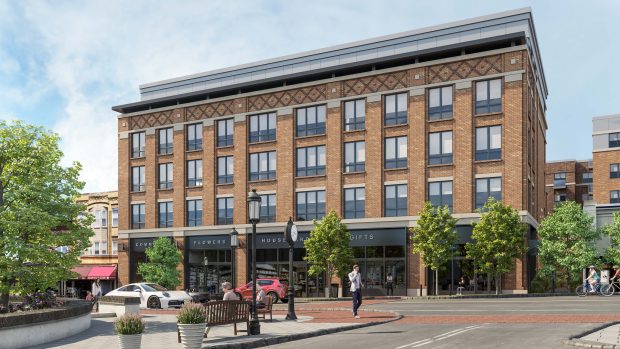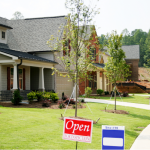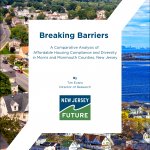New Jersey Future Blog
New Jersey Needs More Housing, and Municipalities are on the Front Lines
July 17th, 2024 by Chris Sturm
Without a safe, stable place to call home, how can people achieve any personal goals?” asked Department of Community Affairs (DCA) Commissioner Jacquelyn Suárez. Her opening remarks kicked off the session, “Housing: What’s Next in New Jersey?” at the 2024 NJ Planning and Redevelopment Conference. Suárez described the agency’s “housing first” model, including programs to facilitate home ownership, prevent homelessness and support walkable downtowns.
Four panelists joined Suárez to discuss solutions to the housing crisis, which affects people of all races and many incomes. Poverty is statewide, explained Peter Rosario, President and Chief Executive Officer at La Casa de Don Pedro, citing applications from mostly white families for free and reduced school lunches in suburban Toms River. But he added, “the biggest density problem in this state is single-family homes, which are weaponized against black and brown communities.”
“Traditional housing that is affordable is being priced out,” said Michele Delisfort, Principal and Managing Partner, Nishuane Group LLC, noting, “Even with a college degree, it’s difficult to afford a home.” Josh Bauer, Staff Attorney at the Fair Share Housing Center declared, “Affordable housing is a racial justice issue.” Stephen Santola, Executive Vice President and General Counsel, at Woodmont Properties asked, “The entry-level cape is getting knocked down and replaced by a larger home selling for so much more—Where are the mid-level people going to live?”
Some solutions will come soon—next June—from the municipalities that must adopt new plans to build affordable housing under the Mount. Laurel doctrine. A new law enacted earlier this year, A4/S50, streamlines and clarifies the process; it assigned tasks to DCA, which Commissioner Suárez described:
- Issue non-binding affordable housing obligations for each municipality in October 2024.
- Gather and publish more robust municipal data on Affordable Housing Trust Funds and the number and type of affordable units that have been constructed.
- Develop criteria to streamline compliance and give municipalities more certainty.
She encouraged the audience to contact her office with concerns and suggestions.
Local officials face many challenges in siting affordable units. “How can communities plan and zone for affordable housing that advances smart growth while managing local opposition?,” asked moderator Chris Sturm, Policy Director for Land Use at New Jersey Future. Commissioner Suárez called for better communication. “People hate change, but elected officials need to have open conversations, and if they know the type of person who will live in affordable housing, it will help,” offering the example of a nurse who needs housing in the community where they provide healthcare. “Education is primary,” added Michele Delisfort, encouraging local leaders to explain redevelopment to stakeholders early and often and to get their feedback. She emphasized understanding the community, and compelling developers to deliver well-designed projects. Josh Bauers argued for a change in perceptions: “A four-story building will NOT detract from the property values of surrounding homes,” adding that people should view “multi-family” housing as “residential”. Steve Santola cited Princeton’s ordinance allowing Accessory Dwelling Units as a test case, which, if successful, could be a statewide remedy.
“People hate change, but elected officials need to have open conversations, and if they know the type of person who will live in affordable housing, it will help”
–Department of Community Affairs Commissioner Suárez
All NJ municipalities urgently need practical tools to design and plan for housing. New housing should not only be affordable but climate resilient and in great neighborhoods where it’s easy to get around without a car and near parks and plazas. Panelists recommended:
- State support to increase local capacity for public outreach and early investment in comprehensive planning.
- Mandatory high-quality training for planning boards, in place of today’s lax program.
- Best practice tools, such as FAQs on planning and redevelopment, “Density by Design – NJ Style”, and templates for hosting effective planning board and governing body meetings.
- The ability to use more affordable housing trust fund monies for presentations and messaging, supported by revised DCA rules.
- Timely technical assistance that reaches towns early, before they begin their lengthy schedule of monthly meetings.

Affordable housing success stories like the Taylor Vose inclusionary housing project in South Orange can help local officials envision solutions for their community. See New Jersey Future’s Smart Growth Award winners for more.
Audience members raised broader affordability concerns, like the role consumer debt plays in limiting access to credit. Commissioner Suárez highlighted the difficulty municipalities face in hiring employees like emergency medical service staff and inspectors who do not earn enough to afford to live where they work. Panelists recommended holistic approaches to making New Jersey affordable—like using regionalization to lower the cost of local government (Suárez ), working with banks and financial institutions (Delisfort), and changing rental and mortgage requirements to focus on on-time rental payments (Rosario).
When asked, “What’s next for housing in 2050?” speakers shared visions that can inspire residents and local leaders today:
- More sustainable housing that relates to the environment, and communities that are better connected. -Michele Delisfort
- Look to student housing to see what’s next. -Stephen Santola
- Better public transportation. -Josh Baurs
- Open air spaces, plazas, and walkability, like those found in other parts of the world. -Peter Rosario
- Walkable, liveable places transformed from past industrial giants and malls. More community-centric places with multi-generational housing. -Commissioner Suárez
Chris Sturm closed the session by announcing that New Jersey Future and partners are launching a collaborative new initiative, Great Neighborhoods for All, which seeks to achieve visions like these because everyone in New Jersey deserves an affordable home in a community that’s a great place to live.
The Great Neighborhoods for All group is advancing three separate but interrelated initiatives:
- Building a statewide movement of local campaigns that advance inclusive, well-planned, and well-designed housing projects.
- Empowering local governments to solve pressing problems, such as addressing accelerating displacement of renters and meeting Mount Laurel Fourth Round deadlines with better planning for neighborhoods.
- Changing state policy in the next eighteen months.
To learn more, email Chris (csturm njfuture
njfuture org) or Alesha Vega (avega
org) or Alesha Vega (avega njfuture
njfuture org) .
org) .
Related Posts
Tags: 2024 NJ Planning and Redevelopment Conference, Affordable housing, Housing, housing and equity, housing obligations, inclusion, inclusionary zoning, Municipal Approach, neighborhoods
















